CPS Unit Number 024-04
Camp: 24
Unit ID: 4
Operating agency: MCC
Opened: 2 1942
Closed: 9 1946
Workers
Total number of workers who worked in this camp: 151
-
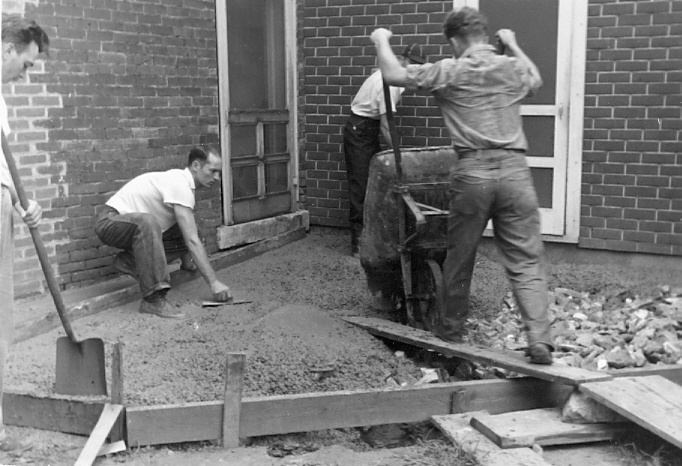 CPS Camp No. 24, subunit 2, Williamsport Maryland.Pouring concrete for the back porch; August 26, 1942. Photo by Robert M. Seese.Digital Image © 2011 Brethren Historical Library and Archives. All Rights Reserved.Aug. 26, 1942
CPS Camp No. 24, subunit 2, Williamsport Maryland.Pouring concrete for the back porch; August 26, 1942. Photo by Robert M. Seese.Digital Image © 2011 Brethren Historical Library and Archives. All Rights Reserved.Aug. 26, 1942 -
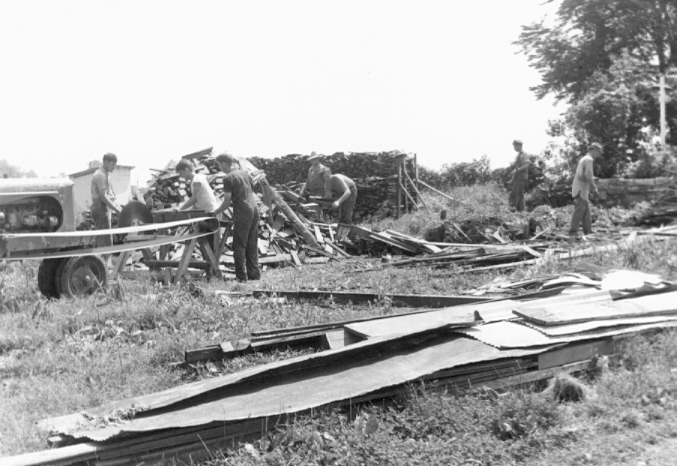 CPS Camp No. 24, subunit 2, Williamsport Maryland.Part of the Saturday afternoon crew sawing up scrap lumber and mowing weeds; Aug. 26, 1942. Photo by Robert M. Seese.Digital Image © 2011 Brethren Historical Library and Archives. All Rights Reserved.
CPS Camp No. 24, subunit 2, Williamsport Maryland.Part of the Saturday afternoon crew sawing up scrap lumber and mowing weeds; Aug. 26, 1942. Photo by Robert M. Seese.Digital Image © 2011 Brethren Historical Library and Archives. All Rights Reserved. -
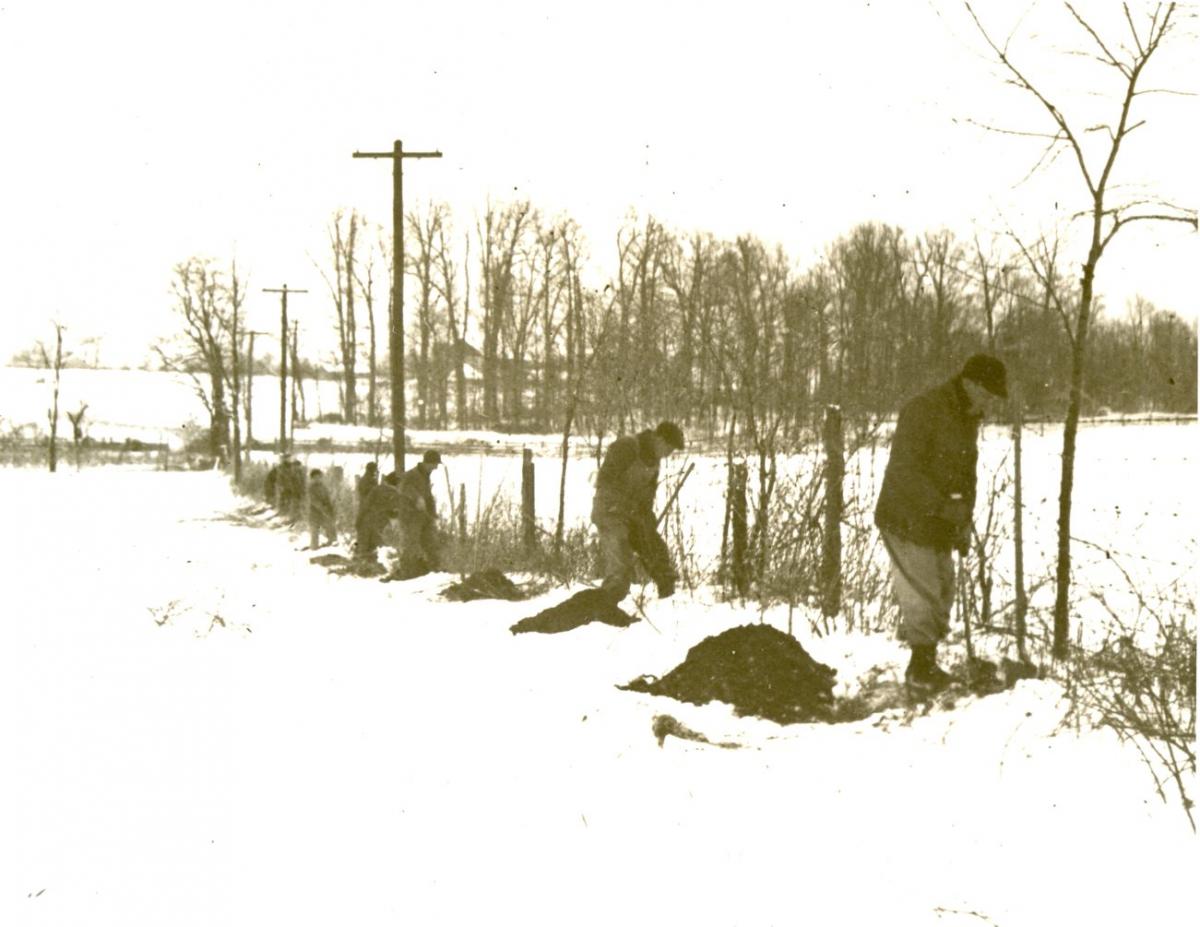 CPS Camp # 24, Hagerstown, MarylandDigging post holes in slop and slushBox 1, Folder 15. MCC Photographs, Civilian Public Service, 1941-1947. IX-13-2.2. Mennonite Central Committee Photo Archive
CPS Camp # 24, Hagerstown, MarylandDigging post holes in slop and slushBox 1, Folder 15. MCC Photographs, Civilian Public Service, 1941-1947. IX-13-2.2. Mennonite Central Committee Photo Archive -
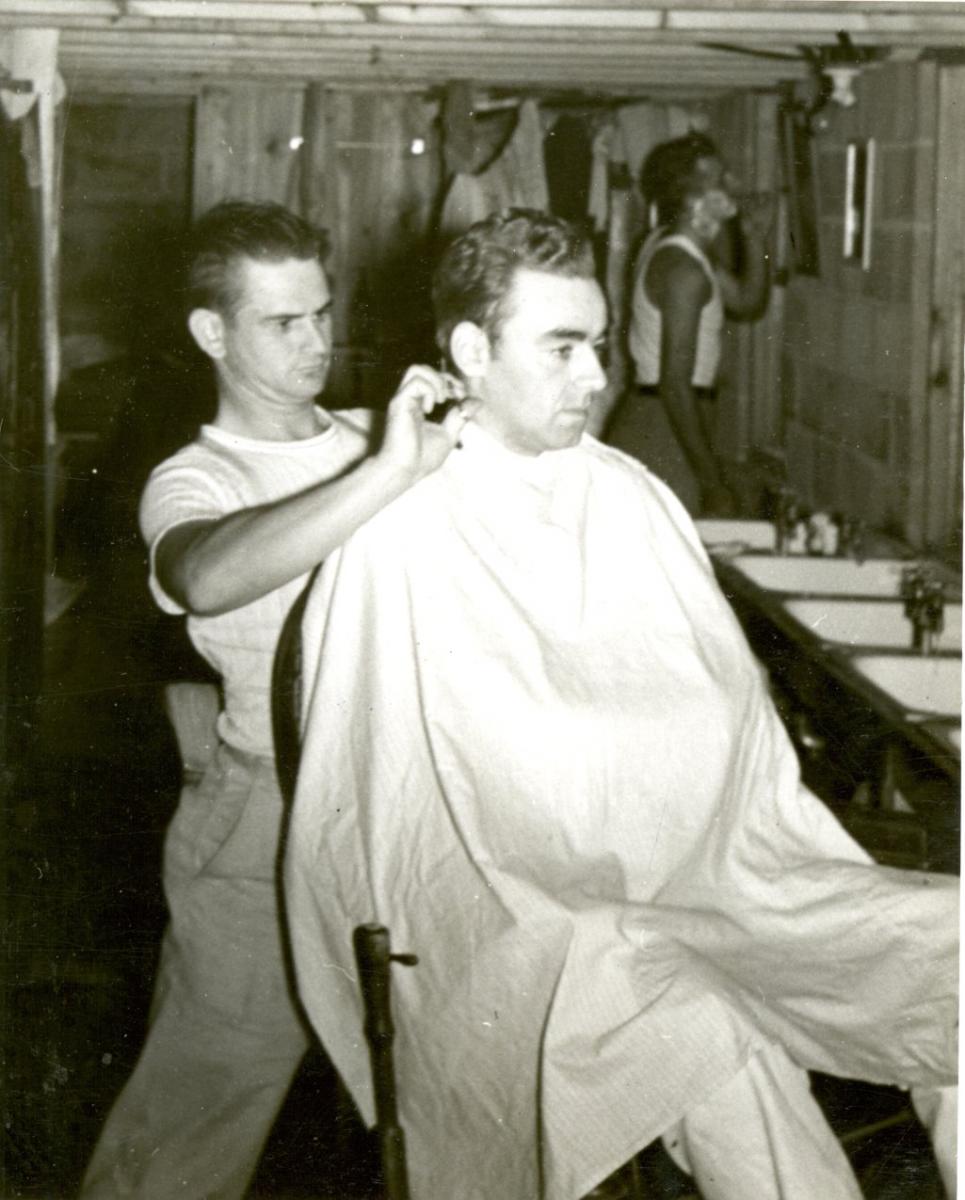 CPS Camp # 24, Hagerstown, Maryland"Campee barber"Photo # 46 Box 1, Folder 15. MCC Photographs, Civilian Public Service, 1941-1947. IX-13-2.2. Mennonite Central Committee Photo Archive
CPS Camp # 24, Hagerstown, Maryland"Campee barber"Photo # 46 Box 1, Folder 15. MCC Photographs, Civilian Public Service, 1941-1947. IX-13-2.2. Mennonite Central Committee Photo Archive
-
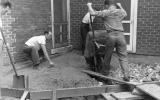 Aug. 26, 1942
Aug. 26, 1942 -
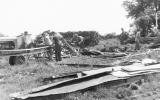
-
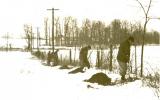
-
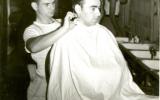
CPS Camp No. 24 subunit 4 at Clear Spring, Maryland, a Soil Conservation Service camp on a farm near Clear Spring, Maryland operated by the Mennonite Central Committee, opened in February, 1942 and closed in September 1946. The men enclosed permanent pastures with tightly woven fences and conducted other activities to prevent soil erosion. A farm and community school provided training and inspiration for men seeking to live in Mennonite communities.
The camp was about five miles north of Clear Spring, a town on US 40 west of Hagerstown. The Mennonite Publishing House of Scottdale, Pennsylvania purchased the farm in the spring of 1942 and loaned it to the Mennonite Central Committee cost-free except for improvements needed on the farm.
Directors: Grant Stoltzfus, Orin Beechy, Orlo Brenneman
Dietician: Virginia Stalter Kreider
Thirty-five men served in the unit. Many entered CPS from rural communities and had reported their occupation as farming or agricultural work.
As was the case in most Mennonite Central Committee camps and units, the majority of men when entering CPS reported affiliation with Mennonite denominational groups.
The men enclosed permanent pastures with tightly woven fences, tilled to improve pastures, built diversion ditches for water control, and constructed a few fish pools. J. Robert Kreider recalled his months spent “in cutting trees for posts, digging post holes and stretching fence. I also did emergency farm labor, especially at harvest time and fought one nearby forest fire. . . .For nearly two years I served as business manager of the unit and also compiled and consolidated the reports of all four units for the Mennonite Central Committee headquarters office.” (“Detour. . .Main Highway”: Our CPS Stories pp. 38-41)
After project hours, the men beautified the grounds around the buildings.
The men constructed barracks, which included a chapel on the lower floor. The general director of the units in CPS 24 lived there and all the records were located in offices there as well.
A farm and community school provided training and inspiration for men seeking to live in Mennonite communities. Unit members took courses on practical farming as well as on the ideals of Christian rural community. Ralph Beechy, a public school principal in Ohio and a director of the Terry, Montana camp, led the school which enrolled twenty-eight men from some eight branches of the Mennonite Church. The school used Mennonite leaders and Soil Conservation staff as lecturers, and their lectures were later published in a book Farm and Community School.
The Christian workers’ school opened during November 1944 to train men in more effective lay leadership in local churches. J. Robert Kreider served as its director.
Virginia Stalter Kreider served as matron-dietician at the camp for fifteen months, the only woman serving the thirty-five men. Occasionally she spoke in the evening church services at the camp and served as “a contact person in building relationships with local churches. . . . The experience taught that a witness for peace is costly and unpopular with people who do not understand the peace position. . . .In my work at the camp I learned to know the view points and practices of the broader church from conservative to liberal. I became well acquainted with the Amish who worked in the camp kitchen. I found some of them quite thoughtful and well read. I would no longer stereotype the Amish.” (“Detour. . .Main Highway”: Our CPS Stories pp. 91-92)
Ruth Brunk Stolzfus, later recalled her experiences at the camp in A Way was Opened: A Memoir.
For more information on CPS No. 24 see Melvin Gingerich, Service for Peace: A History of Mennonite Civilian Public Service. Akron, PA: Mennonite Central Committee printed by Herald Press, Scottdale, PA 1949, pp. 177-181.
For personal stories of CPS men, see Peace Committee and Seniors for Peace Coordinating Committee of the College Mennonite Church of Goshen, Indiana, “Detour. . .Main Highway”: Our CPS Stories. Nappanee, IN: Evangel Press, 1995, 2000.
See also Ruth Brunk Stolzfus with Eve MacMaster, ed. A Way was Opened: A Memoir. Scottdale, PA: Herald Press, 2003.